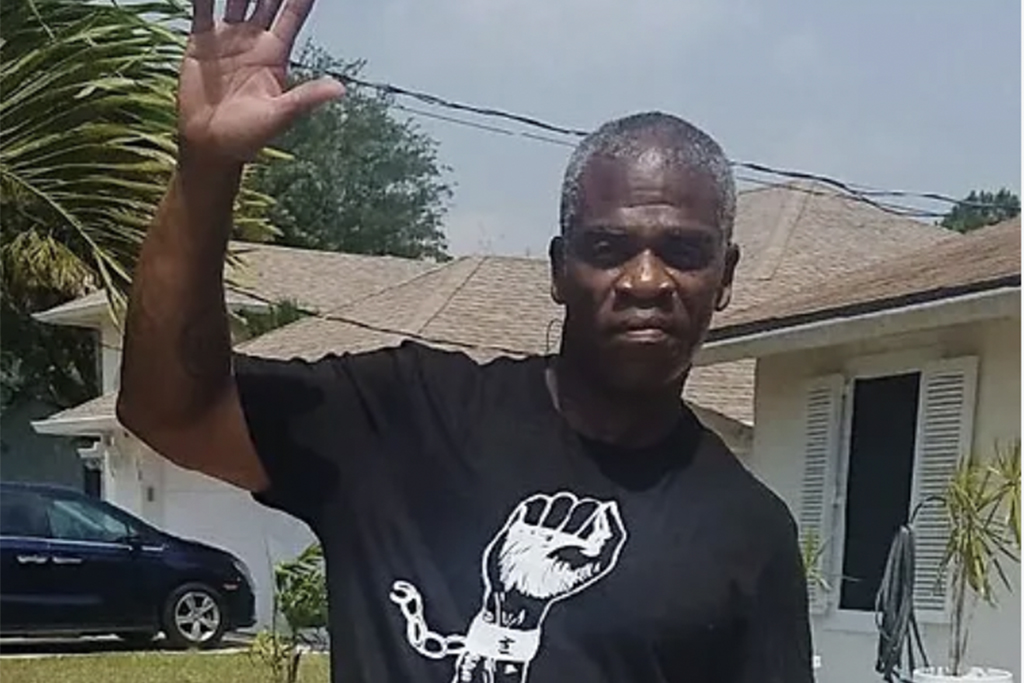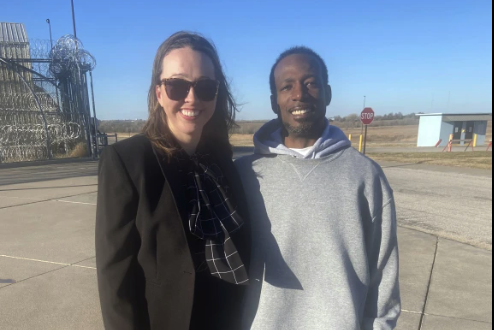Leonard Cure Update: Georgia Police Group Rips News Coverage
Georgia Police Group Defends Cop Killing Leonard Cure By Blaming Media Coverage Of His Exonerated Past

Source: Camden County Sheriff’s Office
A pro-police organization in Georgia is defending last week’s killing of an unarmed Black driver by blaming media coverage about the victim’s recent exoneration from a life sentence of which he served 16 years in prison for a crime he never committed.
Leonard Cure was shot to death on Oct. 16 by Camden County Sheriff’s Deputy Buck Aldridge during a highway traffic stop where the 53-year-old driver was accused of speeding and reckless driving. Video footage released days later showed Aldridge pulling over Cure and immediately ordering him out of the car instead of following the standard procedure of first asking to see the driver’s license, registration and proof of insurance. Cure complied with Aldridge’s orders but began resisting once he was placed under arrest and told that “tickets in the state of Georgia are criminal offenses.”
Notably, no ticket had been issued when Aldridge tased Cure before the two men descended into a physical struggle on the roadside, resulting in the cop firing the fatal shot.
Cure’s family said the video footage showed Aldridge failing to control the situation out of apparent anger.
“The officer got out of the car extremely aggressive, yelling and screaming commands, and my brother complied,” Cure’s brother, Michael Cure, said. “He did comply, so after watching the video, I do believe things could have been handled differently, but I also believe the officer got out being extremely aggressive.”
Civil rights attorney Ben Crump, who is representing Cure’s family, said Aldridge failed to deescalate matters.
“When you have escalation met with escalation, nothing good comes out of it,” Crump said.

Source: Innocence Project
“From what you can see on the video, it doesn’t seem to me that this will be the type of call or the nature of the event that would require for an officer to tase the suspect,” Criminologist Alex del Carmen told News 4. “If the officer has in fact, a history, that he has been using force in the past, and he’s been disciplined in the past, to the extent of being fired, then the police department has a very serious problem in their hands right now.”
None of those above points were referenced in a recent blog post by the Georgia Law Enforcement Organization (GLEO), which instead decided to vilify the news coverage of the shooting while defending Aldridge’s use of lethal force.
“The media was quick to paint a picture of a wrongfully convicted man, recently exonerated, meeting his end at the hands of law enforcement,” GLEO wrote, saying what actually happened was “far more nuanced.”
Such media coverage “feeds into an ongoing narrative that often seeks to vilify law enforcement without delving into the complex dynamics of such encounters,” the blog post added.
The fact that Cure is Black only fueled the media fire, GLEO suggested without mentioning the documented differences in how police treat drivers along racial lines.
“[S]uch divisive narratives do a disservice to the community and law enforcement alike, muddying the waters and obscuring the path to justice and understanding,” GLEO continued.
A study published in 2021 found that police officers speak to Black drivers with less respect than white drivers. Aldridge is white.
GLEO did not mention how Aldridge had been given multiple warnings in years past, particularly about his behavior during traffic stops. An official report suggested he was not “calm, cool, collected” during traffic stops, which seemed to be the case after he pulled over Cure last week.
There was also no mention by GLEO about how Aldridge in 2017 was fired as a police officer after a traffic stop resulted in him picking up a woman and “throwing her on the ground.”
Without the slightest hint of irony, GLEO told the media to do better.
“The media holds a significant responsibility in shaping public perception. A move towards ethical journalism, prioritizing factual reporting over sensationalism, is a crucial step towards bridging the chasm of mistrust,” GLEO concluded its blog post. “Together, with truth as our compass, we can navigate the rough seas of public discourse towards a horizon of understanding and collaboration.”
Broward State Attorney Harold F. Pryor — who worked with advocates to get Cure exonerated from a life sentence in Florida in a wrongful conviction for armed robbery with a firearm and aggravated assault with a firearm in 2003 — said Cure had planned on attending college. Florida Gov. Ron DeSantis earlier this year approved a claim bill that gave Cure more than $800,000 to use toward his education because he was exonerated.
“The Leonard we knew was a smart, funny and kind person,” Pryor said in a statement posted to social media. “After he was freed and exonerated by our office, he visited prosecutors at our office and participated in training to help our staff do their jobs in the fairest and most thorough way possible. He would frequently call to check in on Assistant State Attorney Arielle Demby Berger, the head of the Conviction Review Unit, and offer our team encouragement to continue to do the important work of justice.”
Pryor added: “Leonard was so excited that the Florida Legislature and Gov. Ron DeSantis had recently approved his claims bill. He had been working a job in security, he was hoping to go to college and wanted to work in broadcast radio production, he was buying his first home.”
Cure was freed in 2020.
SEE ALSO:
Byron Donalds Is Latest Republican House Speaker Hopeful With Checkered Past
Tyler Perry Suggests Paramount Inflated BET’s Value While Accepting Bids
















